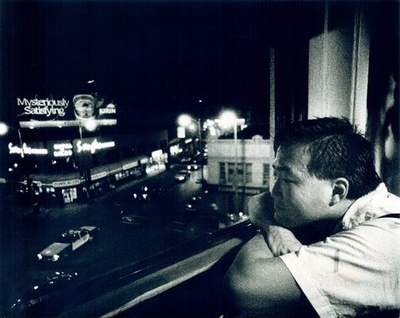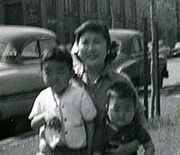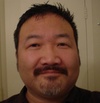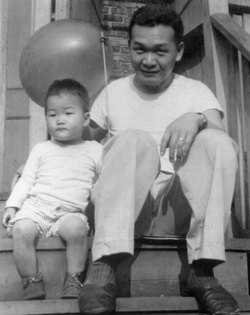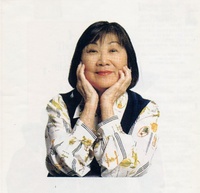When you’re a writer, everything that happens to you is a potential story you will one day write. The more awkward, wacky, horrible or wonderful the moments comprising the experience—the better. The writer’s job is to catch lightning in a jar. To honor the experience by rendering it as vividly on the page as it was lived in life. Sometimes a writer can even write about an experience he’s never had. For example, in one of my novels, I write from the innocent point of view of a baby who hasn’t been born yet. For that I had to use my imagination to create the experience...and then re-create that experience for the reader using words. It’s a little bit like lying, but I prefer to think of it as a kind of pretending.
I can’t tell you exactly how to catch lightning in a jar. Sometimes you think you’ve caught lightning but after a good night’s sleep—you realize it was just a trick of light. Fool’s gold. For me, one way to capture the real thing is to tell truths that people usually don’t tell, because that’s always one way to get a reader’s undivided attention.
Back around 1982, I was working on a poem in the voice of my mother. I wondered how—during this time when over 100,000 Japanese Americans were forced to leave their homes—how did she explain to her fellow high school students where she was going? My mother didn’t remember explaining anything to her friends. She thought maybe she left for the camps on a weekend. But for the sake of the poem, I made it a weekday when she parted. I used my mother’s personality to guide the poem. Her innocent way of looking at the world. Her unfailing belief in the world as a loving place. I used my own imagination to fill in the blanks and imagine the disappointment and embarrassment my mother must have felt too.
When I finished writing this small poem—I was moved. And when I read it to other people—they were moved also. I suspected that I had caught that lightning in a jar I was just talking about. The poem had a life of its own, apart from me. It appears in my poetry book CROSSING WITH THE LIGHT (Tia Chucha Press) available through Amazon. The poem has since gone on to be reprinted in dozens of respected textbooks and anthologies. I have gotten checks for as much as $1,500 for permission to reprint this poem and others, and every year I continue to get such checks. (I mention my fee not to boast, but to inspire. Sometimes poets are paid what they are worth.)
* * * * *
In Response to Executive Order 9066:
All Americans of Japanese Descent Must Report to Relocation Centers
by Dwight Okita
Dear Sirs:
Of course I’ll come. I’ve packed my galoshes
and three packet of tomato seeds. Denise calls them
love apples. My father says where we’re going
they won’t grow.
I am a fourteen-year-old girl with bad spelling
and a messy room. If it helps any, I will tell you
I have always felt funny using chopsticks
and my favorite food is hot dogs.
My best friend is a white girl named Denise --
we look at boys together. She sat in front of me
all through grade school because of our names:
O’Connor, Ozawa. I know the back of Denise’s head very well.
I tell her she’s going bald. She tells me I copy on tests.
We’re best friends.
I saw Denise’s today in Geography class.
She was sitting on the other side of the room.
“You’re trying to start a war,” she said, “giving secrets
away to the Enemy, Why can’t you keep your big
mouth shut?”
I didn’t know what to say.
I gave her a packet of tomato seeds
and asked her to plant them for me, told her
when the first tomato ripened
she’d miss me
* * * * *
The first novel I wrote, THE PROSPECT OF MY ARRIVAL, takes place in the future so I really had to use my imagination. The hook of the story line is this: In the near-future, the first baby is allowed to preview the world before deciding to be born. He gets to meet a handful of people representing the best and worst of humanity: from a greeting card writer to an unstable businessman with a not-so-hidden agenda. And at the end, he will announce his birth decision at a press conference on live TV. That was the idea in a nutshell.
Where did the idea for the book come from? Well, my father Fred Yoshio Okita was a science teacher for elementary school kids. I got to see him try out different science experiments at home. Dad, who died of a heart attack in the 1980s, was something of an armchair philosopher. He was also a proud member of the highly decorated 442nd Battalion, comprised entirely of Japanese American soldiers. I’ve always been fascinated with what science discovers everyday. How memories are physically stored in the mind. The miracle that is psycho-pharmacology. The mapping of the human genome. And I wondered if people were born into the world by their own choosing—would this lead to a happier world than the one we live in now? Often-times humans in our millennium seem so violent, so unhappy, so selfish and lost.
The following is from the opening of the book. Though the book is not yet published, my manager continues to approach literary agents and film producers on my behalf.
* * * * *
The Prospect of My Arrival (an excerpt from the novel)
by Dwight Okita
I have been given the name Prospect because people have high hopes for me. I have high hopes for myself too, but right now I’m just staring out the windows of Trevor Gruehling’s penthouse suite, watching the steady sweep of headlights across Lake Shore Drive. I must say, it’s pretty high up here on the 56th floor. But a high view and a high hope are two different things. Don’t ask me how. Don’t force me to compare and contrast. I can’t do it right now. I’m too worn out from a great night of dancing at Hallucination. Upstairs, Trevor and Kitty have jumped into the shower of the master bathroom. I jump into the shower downstairs because I need to remove the scent of smoke and alcohol that clings to my skin.
A chrome spiral staircase connects the main floor to the upper one. It reminds me of a big strand of DNA. Once I’m out of the shower, I feel new. I open a window. The gentle hush of traffic is surprisingly soothing. It is like putting a seashell to my ear but instead of hearing an ocean—I hear a city and all its voices.
I hear a door swing open. “Prospect, you rat bastard!” shouts a voice from the floor above. “Are you stealing stuff down there? I’ve got security cams everywhere.” He laughs.
“Why would I do that, Trevor? All I have to do is ask nicely and I’m sure you’ll just give me things.”
* * * * *
In 2008, I entered PROSPECT in the Amazon Breakthrough Novel Awards. It was a contest to discover emerging novelists from around the world. I was happy to learn I made the first cut to the Top 1,000. But—with 5,000 entries from around the world—I had a 20% chance of advancing. Then I learned I made it to the Top 100 entries! That was cause for a celebration: dinner with friends. A life-changing moment came in the form of a phone call. I was at work in the West Loop when a man called from Amazon.com in Seattle to tell me I had made it to the Top 10! But the most heart-stopping moment came on the green line train heading home after a day’s work. The man on the other side of the phone asked if I was alone. I laughed. “No, I’m on a crowded train car at rush hour.” He said to call him back when I was in a secure location. And that’s when I learned I had made it to the Top 3 in the Amazon novel contest.
In the end, I did not win the book deal. But a talent manager based in LA read my book and asked to represent me. This past year, he and I have worked well together trying to find a home for my book. My manager wound up connecting me to a gifted writer who adapted my book to be a screenplay. This screenwriter was one of the forces behind the sci-fi movie Children of Men starring Clive Owen. So cross your fingers that there might be a movie at the end of this rainbow. (By the way, my new novel-in-progress is called The Hope Store. It’s also set in the future).
As I mentioned earlier, my father was the armchair philosopher in the family. My parents were always very open-minded and liberal. When I told them in high school that I was gay, they were surprised at first. When I finally asked my dad what he thought about it, he replied, “You’re my son.” Then he went on to tell me of philosophers he admired who were homosexual. My mother’s eventual response was, “Maybe you should meet a nice Japanese fella.” My brother Clyde’s response to my coming out was less welcoming. He simply said: “It figures.” My brother has always had a gift for taking stunning photographs, and he is equally skilled at busting my chops. As brothers often do.
As luck would have it, one day I did meet a very nice Japanese American (or JA as we often say) fella online. Luke and I were both sansei, which means we were third-generation JA. Though he lived clear across the country, we started to make YouTube videos for each other. And one weekend, Luke jumped on a plane and came to meet me. I was quite taken with him. We made a handsome couple. We had chemistry and felt comfortable together. When we kissed, we both commented on how forbidden it felt. Like we were kissing a cousin or something. But it was cool too. Eventually the long distance prevented us from continuing the relationship, but it was big fun while it lasted.
I’ve always been proud that the Japanese American Citizens League (a national JA organization) has been supportive of the civil rights of many different groups, and has specifically been supportive of the rights of gay people to marry. And that Japanese Americans as a group fought for and won reparations for their losses experienced as a result of the internment.
So how much does my being Japanese American influence my view of the world and my writing? I suspect that being JA has some effect. Maybe it’s in my attention to detail, my appreciation of the beauty and depth of life, my awareness of how my behavior directly impacts those around me. A certain politeness, a kindness. Also main characters in my novels often have Japanese last names, and one could say they have Japanese American thoughts and feelings too.
What is the influence of my being gay? As a gay man I know that when I sit in a coffeehouse, for example, I pay particular attention to the men who orbit around me. Especially if they are charming or handsome or deep. And though I can’t prove it, I’d say that being gay may give me certain super powers: sensitivity and really good taste. At the end of the day, maybe my gay inheritance is also a certain passion, an enthusiasm. That’s the first time I connected those dots!
I’ll close my essay on lightning here. I have deep ties that prevent me from wandering very far from Chicago. It’s where my parents met after the war. It’s where my brother and I were born and grew up. It’s where I wrote my first poem. Where I kissed my first sweetheart. Where I learned to chant my Buddhist chant. Where I overcame depression. I developed a great network of friends and colleagues here. I’ve fallen in love many times here. And knowing me, I’ll fall in love many times more. How does being a Chicagoan influence my worldview? Good question. I think being a Chicagoan gives a kind of groundedness. It’s a pretty city. A very livable city. We’re not as flashy as Hollywood; not as toney as Manhattan. But we’re not too far from either. Our weather is diverse and sometimes punishing, but you won’t find a group of humans more grateful for a sunny day. Being a Chicagoan has taught me a kind of flexibility.
My beloved mother, Patsy Takeyo Okita, also loved Chicago. Sadly, she passed away in September 2009. She suffered a stroke at the start of the year and never regained consciousness. She had been my mother and my friend for 51 years. From Patsy, I learned how to be resilient...and the importance of having fun, and of being happy. One of my memories of growing up is standing with her at night at her bedroom window, watching thunderstorms. It was a time when mother nature showed her flair for the dramatic. The spray of mist on our faces was refreshing; the thunder and lightning was both beautiful and scary at the same time. If I could have caught lightning in a jar and saved it for my mother...I would have. And knowing my mother as I do—she would have been delighted.
* * * * *
from Dwight Okita’s Memorial Speech
for his mother Patsy Okita
I remember as Mom got older, she’d reach for my hand when crossing the street. At first, it was because it was winter and slippery outside. But in time, she’d reach for my hand all year round. One time she went with me and a group of friends to Millennium Park. I noticed how, if I wasn’t around, she’d grab the hand of any one of my friends standing nearby...to help her cross the street. And my friends—because they loved her—were happy to oblige.
When hospice removed mom from the ventilator—it was a profound and powerful moment. I thought she’d die instantly. It was heartbreaking to watch—some of you in this room were with me at that moment—and thank you for being there. Mom surprised everyone by breathing on her own for a week and a half. The very last day of mom’s life...hospice called to say she was getting close to passing. I came to her room and talked to her. I kissed her and noticed her cheek was getting cold. Then a little while later the nurse took her pulse and said: “I’m sorry. Your mother just passed.” It was such a peaceful transition, I didn’t even notice she’d left.
I like to think that Mom was waiting for me to come back. So that I could hold her hand one more time, as I always did, and help her cross the busy street.
* * * * *
END
* This article was originally published in Voices of Chicago, online journal of the Chicago Japanese American Historical Society.
© 2009 Dwight Okita


